|
De Oostenrijkse schrijver en essayist Egyd Gstättner werd geboren op 25 mei 1962 in Klagenfurt. Zie ook alle tags voor Egyd Gstättner op dit blog.
Uit: Absturz aus dem Himmel
„Die zur Wahl stehenden Spitzenkandidaten selbst hätten bei ihren Wahlveranstaltungen immer wieder ausdrücklich betont, von welcher Bedeutung jede einzelne Stimme in Hinblick auf die nächsten Jahre und Jahrzehnte für das Schicksal dieses Staates, und das heißt: für uns alle ist. Nach vergeblichen Appellen ranghoher Funktionäre, sich doch endlich zu entscheiden, ganz egal wie, und also dieser Absurdität ein Ende zu bereiten, begeben sich nun die Generalsekretäre, das sind die Muttertagsgedichte der Parteien, persönlich an den Untatort und diskutieren vor laufender Kamera die aktuelle Entwicklung miteinander. Untereinander sind die Muttertagsgedichte bekanntlich Hasstiraden. Nachdem sie die ursprüngliche Vermutung, es handle sich bei diesem ungebetenen Zauderer und Zögerer, bei diesem Untäter um einen albernen Spaßvogel, um einen Wichtigtuer und Quertreiber und Queraussteiger, um einen renitenten Klienten, um ein subversives Element, um einen Billig-Bakunin, aus taktischen und strategischen Überlegungen unisono zurückgewiesen haben, schütten sie nun demonstrativ Lob in die Wahlzelle. Dieser Mann sei das Musterbeispiel des mündig gewordenen Wählers, er verkörpere geradezu Gewissenhaftigkeit und politische Kultur, er lege ein eindrucksvolles Bekenntnis zu unserer Demokratie ab, auch der Bundeskanzler und der Oppositionsführer seien dieser Meinung. Es herrsche noch keinerlei Grund zur Panik, dieser wertvolle Staatsbürger werde sich über kurz oder lang für das Bessere entscheiden. Sie sind für ihn, weil er gegen sie ist, er sagt, was wir denken. Durchaus denkbar, diesem wertvollen Wähler Verdienste um die Parteien und die Republik anzubieten, eine verantwortungsvolle Tätigkeit, eine Spitzenfunktion, einen Ehrentitel, ein Denkmal, eine Goldbüste, Händeschütteln, so viel er will. Vorderhand freilich bleibt die erste Hochrechnung geheim, vorderhand drohen anarchische Zustände, vorderhand schalten die Kabelfernseher zu Wa(h)re Liebe um, heute: Potenzprobleme in der Peepshow et cetera. Aber diese meine Idee wurde von der Idee durchkreuzt, eine Geschichte zu schreiben, wie einer zeitgeschichtlich und gesamtpolitisch sehr bedenklich in der Badewanne sitzt, mit Lautstärke sechs Rossinis Il Barbiere di Siviglia hört und Ludwig Marcuses Philosophie des Glücks liest. Leider dringt er aber nicht einmal bis zu den Epikureern vor, denn bei Largo al factotum della cittd fängt er vor lauter Orgasmus zu dirigieren an, Marcuse plumpst ins Schaumbad und scheidet aus. Ja, entscheiden müsste man sich können. Dann noch die Geschichte, wie ich gleichzeitig Ginka Steinwachs lese und das Wimbledonfinale Agassi: Ivanisevic schaue…“
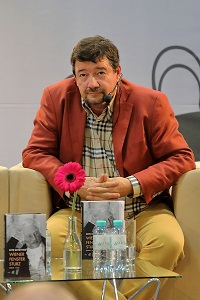
Egyd Gstättner (Klagenfurt, 25 mei 1962)
De Canadese schrijfster Madeleine Thien werd geboren op 25 mei 1974 in Vancouver, Brits Columbia. Zie ook alle tags voor Madeleine Thien op dit blog.
Uit: Do Not Say We Have Nothing
“Dizzy, I leaned against the glass.
And suddenly I was in the car with my father. I heard rain splashing up over the tires and my father, humming. He was so alive, so beloved, that the incomprehensibility of his suicide grieved me all over again. By then, my father had been dead for two decades, and such a pure memory of him had never come back to me. I was thirty-one years old.
I went inside the store. The pianist, Glenn Gould, appeared on a flatscreen: he and Yehudi Menuhin were performing the Bach sonata I had recognized. There was Glenn Gould hunched over the piano, wearing a dark suit, hearing patterns far beyond the range of what most of us are given to perceive, and he was . . . so familiar to me, like an entire language, a world, I had forgotten.
In 1989, life had become a set of necessary routines for my mother and me: work and school, television, food, sleep. My father’s first departure happened at the same time as momentous events occurring in China, events which my mother watched obsessively on CNN. I asked her who these protesters were, and she said they were students and everyday people. I asked if my father was there, and she said, ‘No, it’s Tiananmen Square in Beijing.’ The demonstrations, bringing over a million Chinese citizens into the streets, had begun in April, when my father still lived with us, and continued after he disappeared to Hong Kong. Then, on June 4th, and in the days and weeks following the massacre, my mother wept. I watched her night after night. Ba had defected from China in 1978 and was forbidden from re-entering the country. But my incomprehension attached itself to the things I could see: those chaotic, frightening images of people and tanks, and my mother in front of the screen.
That summer, as if in a dream, I continued my calligraphy lessons at the nearby cultural centre, using brush and ink to copy line after line of Chinese poetry. But the words I could recognize—big, small, girl, moon, sky (大, 小, 女, 月, 天)—were few. My father spoke Mandarin and my mother Cantonese, but I was fluent only in English. At first, the puzzle of the Chinese language had seemed a game, a pleasure, but my inability to understand began to trouble me. Over and over, I wrote characters I couldn’t read, making them bigger and bigger until excess ink soaked the flimsy paper and tore it. I didn’t care. I stopped going.”
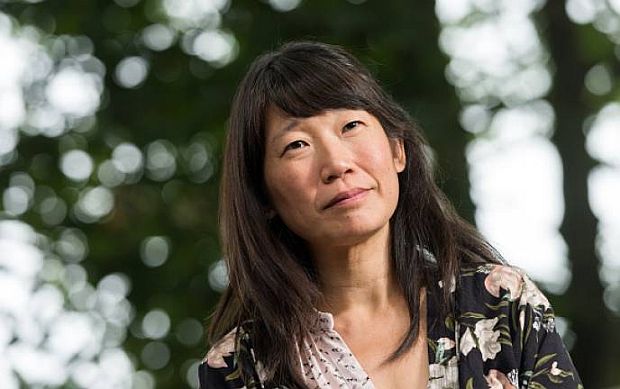
Madeleine Thien (Vancouver, Brits Columbia, 25 mei 1974)
De Franse schrijfster Claire Castillon werd geboren op 25 mei 1975 in Neuilly-sur-Seine. Zie ook alle tags voor Claire Castillon op dit blog.
Uit: Les Bulles
“Je préférerais que tu viennes. Autrement, c'est trop compliqué. D'ailleurs, viens à dix-neuf heures. Si je n'ai pas le temps de préparer le dîner, on commandera une pizza. Mais si tu peux, ou plutôt si tu en veux, apporte le vin. Moi, je ne bois plus. Je risque d'oublier d'en prendre. Quand tu as un enfant, les courses, ça passe après. Tu te dépêches de le retrouver en sortant du bureau, c'est la priorité ! Comment t'expli-quer... Tu troques tes talons contre des semelles tout terrain. En fait, tu évolues. J'ai changé, je m'habille en sportswear afin de me sentir à l'aise pour marcher à quatre pattes avec la toutouille. Je ne peux plus m'attifer comme tu le fais, toi qui n'es pas encore mère, oui, je ne peux plus faire la pute ! Je plaisante 1 Au fait, est-ce que tu portes toujours cette minijupe que nous avions achetée ensemble ? Qu'en dit ton mec ? C'est fini ! Encore ! Faudra que tu me racontes. Ça fait combien de temps qu'on ne s'est pas vues ? Assez pour en changer douze fois, j'imagine ! Tu me fais rire !
La vie te transformera quand tu auras un enfant, mais tu ne regretteras pas pour autant le passé. Et puis le tien aura été bien rempli ! En fait, tu cerneras mieux tes priorités. Quand je vois Annabelle me tendre les bras, je retrouve le sens de la vie, j'accède aux valeurs fondamentales. La rigueur est d'ailleurs devenue mon cheval de bataille. Cela peut te sembler bizarre, mais quand tu as un enfant, tu t'organises. Les choses doivent rouler, sinon, c'est la débâcle. Grâce à Annabelle, je suis programmée comme un ordinateur. Jacques la dépose à la crèche chaque matin. Je l'habille, mais lui la conduit. Le soir, c'est moi qui vais la rechercher. Donc je déjeune rapide-ment afin de pouvoir quitter le bureau à cinq heures et quart. Si j'attrape le bus de vingt-deux, je suis ponctuelle. S'il me passe sous le nez, je cours et j'arrive quand même à l'heure ! La crèche ferme à six heures. C'est normal. Les assis-tantes maternelles ont aussi des enfants, il faut bien qu'elles rentrent chez elles. Tu te rends compte que ces pauvres femmes gardent les enfants des autres et n'ont pas le droit d'inscrire les leurs dans la crèche où elles travaillent ? Tu vois l'injustice ? Allô ? Tu m'écoutes ? Ah ! je croyais que nous avions été coupées. »
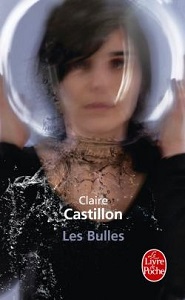
Claire Castillon (Neuilly-sur-Seine, 25 mei 1975)
Cover
De Amerikaanse schrijfster en feminste Eve Ensler werd op 25 mei 1953 in New York geboren. Zie ook alle tags voor Eve Ensler op dit blog.
Uit I am an emotional creature (Fragment)
I love being a girl.
I can feel what you’re feeling
as you’re feeling it inside
the feeling
before.
I am an emotional creature.
Things do not come to me
as intellectual theories or hard-shaped ideas.
They pulse through my organs and legs
and burn up my ears.
I know when your girlfriend’s really pissed off
even though she appears to give you what
you want.
I know when a storm is coming.
I can feel the invisible stirrings in the air.
I can tell you he won’t call back.
It’s a vibe I share.
I am an emotional creature.
I love that I do not take things lightly.
Everything is intense to me.
The way I walk in the street.
The way my mother wakes me up.
The way I hear bad news.
The way it’s unbearable when I lose.
I am an emotional creature.
I am connected to everything and everyone.
I was born like that.
Don’t you dare say all negative that it’s a
teenage thing
or it’s only only because I’m a girl.
These feelings make me better.
They make me ready.
They make me present.
They make me strong.
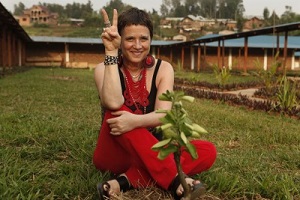
Eve Ensler (New York, 25 mei 1953)
De Duitse schrijver Friedrich Dieckmann werd geboren op 25 mei 1937 in Landsberg an der Warthe. Zie ook alle tags voor Friedrich Dieckmann op dit blog.
Uit: Freiheit ist nur in dem Reich der Träume (Schillers Jahrhundertwende)
„Versuchen wir, uns in seine Erinnerungen einzuschalten? »Kabale und Liebe« war nicht Schillers letztes Theaterstück gewesen.
In Dresden, wo er nach Mannheimer Bedrängnissen Zuflucht bei hochherzigen Freunden, Gottfried und Minna Körner, gefunden hatte, hatte er »Dom Karlos« vollendet, das Schmerzenskind seiner dramatischen Muse, ein nicht enden wollendes Stück aus dem Spanien des sechzehnten Jahrhunderts. Es hatte ihn mehr als vier Jahre lang beschäftigt und war, als er es 1787 bei dem Leipziger Verleger Göschen, seinem Freund, in Druck gab, auf mehr als sechstausend Verse angeschwollen. Dennoch hatte dieser »Karlos«, in Bühnenfassungen von seiner eigenen und von fremder Hand, seinen Weg über die deutschen Bühnen genommen und war noch anno 87, dem Jahr des Erstdrucks, in Hamburg und Leipzig und sogar in demrussisch regierten Riga gespielt worden. Mannheim, Mainfrankfurt und Berlin waren im nächsten Jahr gefolgt.
Doch den Autor hatte sein eigenes Stück auf der Bühne nicht erreicht. Nach dem Erscheinen der Buchausgabe war er von Dresden nach Hamburg aufgebrochen, um dort die Uraufführung unter der Leitung Friedrich Ludwig Schröders zu erleben, der einer der bedeutendsten deutschen Schauspieler war und ihn zu längerem Verweilen eingeladen hatte. Aber Schiller war in Hamburg niemals angekommen. Die Reise hatte ihn über Weimar geführt, wo eine Frau seiner wartete, die ihn schon in Mannheimer Tagen in ihren Bann gezogen hatte: Charlotte v. Kalb, die literarisch bewanderte Gattin eines in pfälzischen Diensten stehenden Offiziers, dem sie aus Familienrücksichten verheiratet worden war. Die Sechsundzwanzigjährige hatte sich in Weimar niedergelassen, und er hatte eine Ablenkung nötig; in Dresden hatte ihn die aussichtslose Liebschaft mit einem bildschönen, aber gänzlich unvermögenden Adelsfräulein in schwere Verwirrung gestürzt, die durch Minna Körner noch geschürt worden war.
Weimar, das war nicht nur Charlotte v. Kalb. Das war Wieland, mit demer vor Jahren schon einmal korrespondiert hatte, es war Herder, den er nun ebenfalls kennenlernte, und es war ein Herzog (Sachsen-Weimar-Eisenach hieß das kleine, an dreihunderttausend Einwohner umfassende Land, das jener als Reichsfürst regierte), der ihn drei Jahre zuvor in Darmstadt nach einer Lesung aus dem werdenden »Karlos« mit dem Titel eines weimarischen Rates ausgezeichnet hatte. Natürlich,Weimar war auch und vor allem Goethe.“

Friedrich Dieckmann (Landsberg an der Warthe, 25 mei 1937)
Cover
De Amerikaanse dichter en schrijver Raymond Carver werd geboren op 25 mei 1938 in Port Angeles. Zie ook alle tags voor Raymond Carver op dit blog.
Balsa Wood
My dad is at the stove in front of a pan with brains
and eggs. But who has any appetite
this morning? I feel as flimsy as
balsa wood. Something has just been said.
My mom said it. What was it? Something.
I'll bet, that bears on money. Ill do my part
if I don't cat. Dad turns his back on the stove.
"I'm in a hole. Don't dig me no deeper."
Light leaks in from the window. Someone's crying.
The last thing I recall is the smell
of burned brains and eggs. The whole morning
is shoveled into the garbage and mixed
with other things. Sometime later
he and I drive to the dump. ten miles out.
We don't talk. We throw our bags and cartons
onto a dark mound of stuff. Rats screech.
They whistle as they crawl out of' rotten sacks,
dragging their bellies. We get back in the car
and watch the smoke and fire. The motor's running.
I smell the airplane glue on my fingers.
He looks at me as I bring my fingers to my nose.
Then looks away again, toward town.
He wants to say something but can't.
He's a million miles away. We're both far away
from there, and still someone's crying. Even then
I was beginning to understand how it's possible
to be in one place. And someplace else, too.
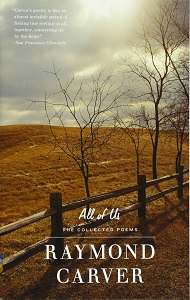
Raymond Carver (25 mei 1938 – 2 augustus 1988)
Cover
De Amerikaanse schrijfster Jamaica Kincaid (eig.Elaine Cynthia Potter Richardson) werd geboren in Saint John's, Antigua en Barbuda, op 25 mei 1949. Zie ook alle tags voor Jamaica Kincaid op dit blog.
Uit: Annie John
„Her father made bricks, and her mother dressed in a way that my father found unbecoming. I heard my mother describe to my father just how Nalda had died: She had a fever, they noticed a change in her breathing, so they called a car and were rushing her off to Dr. Bailey when, just as they were crossing over a bridge, she let out a long sigh and went limp. Dr. Bailey pronounced her dead, and when I heard that I was so glad he wasn’t my doctor. My mother asked my father to make the coffin for Nalda, and he did, carving bunches of tiny flowers on the sides. Nalda’s mother wept so much that my mother had to take care of everything, and since children were never prepared by undertakers, my mother had to prepare the little girl to be buried. I then began to look at my mother’s hands differently. They had stroked the dead girl’s forehead; they had bathed and dressed her and laid her in the coffin my father had made. My mother would come back from the dead girl’s house smelling of bay rum—a scent that for a long time afterward would make me feel ill. For a while, though not for very long, I could not bear to have my mother caress me or touch my food or help me with my bath. I especially couldn’t bear the sight of her hands lying still in her lap.
At school, I told all my friends about this death. I would take them aside individually, so I could repeat the details over and over again. They would listen to me with their mouths open. In turn, they would tell me of someone they had known or heard of who had died. I would listen with my mouth open. One person had known very well a neighbor who had gone swimming after eating a big lunch at a picnic and drowned. Someone had a cousin who in the middle of something one day just fell down dead. Someone knew a boy who had died after eating some poisonous berries. “Fancy that,” we said to each other.
* * *
I loved very much—and so used to torment until she cried—a girl named Sonia. She was smaller than I, even though she was almost two years older, and she was a dunce—the first real dunce I had ever met. She was such a dunce that sometimes she could not remember the spelling of her own name. I would try to get to school early and give her my homework, so that she could copy it, and in class I would pass her the answers to sums.”
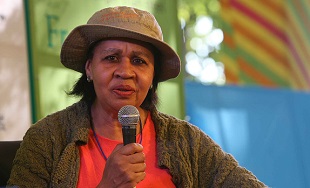
Jamaica Kincaid (Saint John's, 25 mei 1949)
De Amerikaanse schrijver Robert Ludlum werd geboren in New York op 25 mei 1927. Zie ook alle tags voor Robert Ludlum op dit blog.
Uit: The Road to Gandolfo
"That son of a bitch!" Brigadier General Arnold Symington brought the paperweight down on the thick layer of glass on his Pentagon desk. The glass shattered; fragments shot through the air in all directions. "He couldn't!"
"He did, sir," replied the frightened lieutenant, shielding his eyes from the office shrapnel. "The Chinese are very upset. The premier himself dictated the complaint to the diplomatic mission. They're running editorials in the Red Star and broadcasting them over Radio Peking."
"How the hell can they?" Symington removed a piece of glass from is little finger. "What the hell are they saying? 'We interrupt this program to announce that the American military representative, General MacKenzie Hawkins, shot the balls off a ten-foot jade statue in Son Tai Square'?—Bullshit! Peking wouldn't allow that; it's too goddamned undignified."
"They're phrasing it a bit differently, sir. They say he destroyed an historic monument of precious stone in the Forbidden City. They say it's as though someone blew up the Lincoln Memorial."
"It's a different kind of statue! Lincoln's got clothes on; his balls don't show! It's not the same!"
"Nevertheless, the White House thinks the parallel is justified, sir. The President wants Hawkins removed. More than removed, actually; he wants him cashiered. Court-martial and all. Publicly."
"Oh, for Christ's sake, that's out of the question." Symington leaned back in his chair and breathed deeply, trying to control himself. He reached out for the report on his desk. "We'll transfer him. With a reprimand. We'll send transcripts of the—censure, we'll call it a censure—to Peking."
"That's not strong enough, sir. The State Department made it clear. The President concurs. We have trade agreements pending—"
"For Christ's sake, Lieutenant!" interrupted the brigadier. "Will someone tell that spinning top in the Oval Office that he can't have it on all points of the compass! Mac Hawkins was selected. From twenty-seven candidates. I remember exactly what the President said. Exactly. 'That mother's perfect!' That's what he said."
"That's inoperative now, sir. He feels the trade agreements take precedent over prior considerations." The lieutenant was beginning to perspire.
"You bastards kill me," said Symington, lowering his voice ominously. "You really frost my apricots. How do you figure to do that? Make it 'inoperative,' I mean. Hawkins may be a sharp pain in your diplomatic ass right now, but that doesn't wash away what was operative. He was a fucking teen-age hero at the Battle of the Bulge and West Point football; and if they gave medals for what he did in Southeast Asia, even Mac Hawkins isn't strong enough to wear all that hardware! He makes John Wayne look like a pansy! He's real; that's why that Oval Yo-yo picked him!"
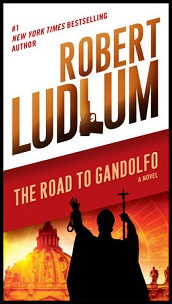
Robert Ludlum (25 mei 1927 – 12 maart 2001)
Cover
De Amerikaanse dichter Theodore Huebner Roethke werd geboren in Saginaw, Michigan op 25 mei 1908. Zie ook alle tags voor Theodore Roethke op dit blog.
The Visitant
1
A cloud moved close. The bulk of the wind shifted.
A tree swayed over water.
A voice said:
Stay. Stay by the slip-ooze. Stay.
Dearest tree, I said, may I rest here?
A ripple made a soft reply.
I waited, alert as a dog.
The leech clinging to a stone waited;
And the crab, the quiet breather.
2
Slow, slow as a fish she came,
Slow as a fish coming forward,
Swaying in a long wave;
Her skirts not touching a leaf,
Her white arms reaching towards me.
She came without sound,
Without brushing the wet stones,
In the soft dark of early evening,
She came,
The wind in her hair,
The moon beginning.
3
I woke in the first of morning.
Staring at a tree, I felt the pulse of a stone.
Where’s she now, I kept saying.
Where’s she now, the mountain’s downy girl?
But the bright day had no answer.
A wind stirred in a web of appleworms;
The tree, the close willow, swayed.

Theodore Roethke (25 mei 1908 - 1 augustus 1963)
Het huis waar de dichter opgroeide, nu het Theodore Roethke Home Museum
Zie voor nog meer schrijvers van de 25e mei ook mijn blog van 25 mei 2017 en ook mijn blog van 25 mei 2015 deel 2
25-05-2018 om 18:08
geschreven door Romenu 
Tags:Egyd Gstättner, Madeleine Thien, Claire Castillon, Friedrich Dieckmann, Eve Ensler, Raymond Carver, Jamaica Kincaid, Robert Ludlum, Theodore Roethke, Romenu
|

